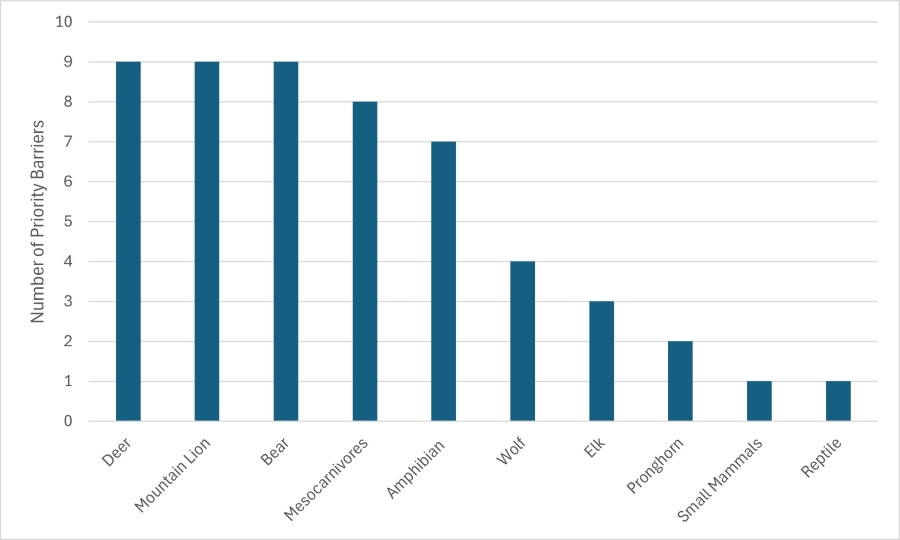Regional Summary
CDFW staff identified a total of 28 wildlife barrier segments in Region 4. Ten of these segments were identified as priority wildlife barriers. Seven of the ten segments identified as priority barriers in 2020 remained as priorities in 2024. There were three new priority barriers added in 2024 (W102, W203, and W207). Three barriers are shared with Region 6 (W038, W205, W133), two barriers are shared with Region 5 (W036, W209), and three barriers are shared with Region 3 (W024, W030, W041). Top priority and priority barriers ranged in length from 1.6 to 115.9 kilometers (km) (mean = 33.1 km) and collectively represented 364.1 km of linear infrastructure.
Terrestrial Wildlife Connectivity Barriers Map. Open full-screen
Ten of the priority segments were characterized as barriers for large mammals, and each identified deer, mountain lions, and black bears as target species. W030 coincided with a SO 3362 priority area and included both deer and elk as target species. One barrier segment (W035) was identified as a barrier for primarily smaller species including kit fox, blunt-nosed leopard lizard, Tipton kangaroo rat, and San Joaquin antelope squirrel. Kit foxes were also associated with a second barrier segment (W036), badgers were listed as an additional target species for two barrier segments, and bobcats and fishers were identified as additional target species for one barrier segment each. Five of the ten priority segments (50%) bisect the primary connections within or between ecologically important mountain ranges within Region 4. Additionally, segment W035 bisects important conservation lands, and W039, the main road into Kings Canyon National Park, splits the winter range for deer in the vicinity. Notably, segment W036 includes the location where collared wolf OR-93 was killed by a vehicle strike in November 2021.
 Target species for priority wildlife connectivity barriers in Region 4 (Central Region).
Target species for priority wildlife connectivity barriers in Region 4 (Central Region).
| Name |
Title |
Phone |
| Michael Sawaya |
Region 4 Connectivity Specialist |
(805) 594-6118 |
| Juan Lopez Torres |
Wildlife Connectivity Unit Supervisor |
(916) 268-3079 |
| Colton Wise |
Statewide Connectivity Specialist |
(916) 268-2505 |